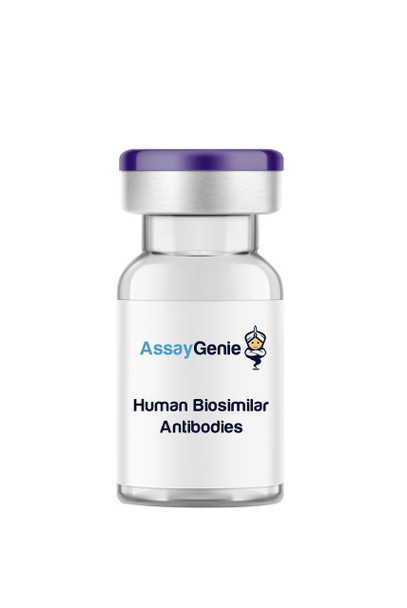Description
| Product Name: | Anti-Human EGFR (Necitumumab) |
| SKU: | IVMB0516 |
| Size: | 500 µg |
| Antibody Type: | Biosimilar Recombinant Human Monoclonal Antibody |
| Clone: | IMC-11F8 |
| Target: | EGFR |
| Isotype: | Human IgG1κ |
| Host Species: | Human |
| Reactivity: | Human |
| Applications: | ELISA |
| Expression Host: | HEK-293 Cells |
| FC Effector Activity: | Muted |
| Synonyms: | Epidermal growth factor receptor, ErbB1, Anti-Human EGFR, IMC-11F8 |
| Product Concentration: | ≥ 5.0 mg/ml |
| Purity: | ≥95% by SDS Page |
| Immunogen: | Human EGFR/ErbB1 |
| Endotoxin Level: | < 1.0 EU/mg as determined by the LAL method |
| Applications and Recommended Usage: | FA, ELISA, WB |
| Antigen Distribution: | EGFR is overexpressed on the cell surfaces of various tumor cell types and is also found in the plasma membranes, cytoplasm, and cell junctions of many healthy tissues, including those associated with the Skin – Epidermis development cluster of The Human Protein Atlas. EGFR is also found in the blood secretome. |
| Formulation: | This biosimilar antibody is aseptically packaged and formulated in 0.01 M phosphate buffered saline (150 mM NaCl) PBS pH 7.2 - 7.4 with no carrier protein, potassium, calcium or preservatives added. Due to inherent biochemical properties of antibodies, certain products may be prone to precipitation over time. Precipitation may be removed by aseptic centrifugation and/or filtration. |
| Specificity: | This non-therapeutic biosimilar antibody uses the same variable region sequence as the therapeutic antibody Necitumumab. This product is for research use only. Necitumumab activity is directed against Human EGFR. |
| Additional Applications Reported In Literature: | FC IP |
Epidermal growth factor receptor (EGFR, also known as ErbB1 or HER-1) belongs to the receptor tyrosine kinase superfamily and is a transmembrane glycoprotein that activates various signaling pathways fundamental to cellular proliferation, differentiation, and survival1, 2. EGFR plays important roles during embryogenesis, organogenesis, and in the growth, differentiation, maintenance, and repair of adult tissues2, including autophagy3. EGFR is also a host factor that facilitates viral entry for hepatitis B4, hepatitis C5, and gastroenteritis6 and plays a role in SARS-CoV-2 infection7, 8, 9. Dysregulation, somatic mutation, and/or altered signaling of EGFR are associated with disease (Parkinson’s2, Alzheimer’s1,2, and amyotrophic lateral sclerosis2) and various cancers (lung, glioblastoma, brain, breast, colorectal, ovarian)3. Additionally, in cancer, aberrant activation of EGFR is associated with increased cell proliferation, invasion, metastasis, angiogenesis, and decreased apoptosis10. As such, EGFR is the target of multiple cancer therapies, including monoclonal humanized antibodies, such as necitumumab, as well as selective small molecule inhibitors.
Necitumumab inhibits EGFR-dependent tumor cell proliferation and metastasis11 by acting as an EGFR antagonist that binds specifically and with high affinity to human EGFR, thereby blocking ligand binding and neutralizing ligand-induced EGFR phosphorylation and downstream signaling pathways10, 11, 12. Anti-tumor activity has been demonstrated in vitro and in vivo 10, and necitumumab is FDA approved for treatment of adult patients with locally advanced or metastatic EGFR-expressing squamous non-small cell lung cancer11. In vitro studies have shown that necitumumab induces internationalization and degradation of EGFR, leading to antibody-dependent cellular cytotoxicity in EGFR-expressing cells10, 11. Necitumumab was generated from the Dyax Corp proprietary phage display library by ImClone Systems, a wholly owned subsidiary of Eli Lilly10.
| Ligand/Receptor: | Epidermal growth factor receptor |
| State of Matter: | Liquid |
| Regulatory Status: | Research Use Only (RUO). Non-Therapeutic. |
| Product Preparation: | Recombinant biosimilar antibodies are manufactured in an animal free facility using onlyin vitroprotein free cell culture techniques and are purified by a multi-step process including the use of protein A or G to assure extremely low levels of endotoxins, leachable protein A or aggregates. |
| Pathogen Testing: | To protect mouse colonies from infection by pathogens and to assure that experimental preclinical data is not affected by such pathogens, all of Leinco’s recombinant biosimilar antibodies are tested and guaranteed to be negative for all pathogens in the IDEXX IMPACT I Mouse Profile. |
| Storage and Handling: | Functional grade biosimilar antibodies may be stored sterile as received at 2-8°C for up to one month. For longer term storage, aseptically aliquot in working volumes without diluting and store at -80°C. Avoid Repeated Freeze Thaw Cycles. |
| UniProt: | P00533 |
| Research Area: | Biosimilars |






